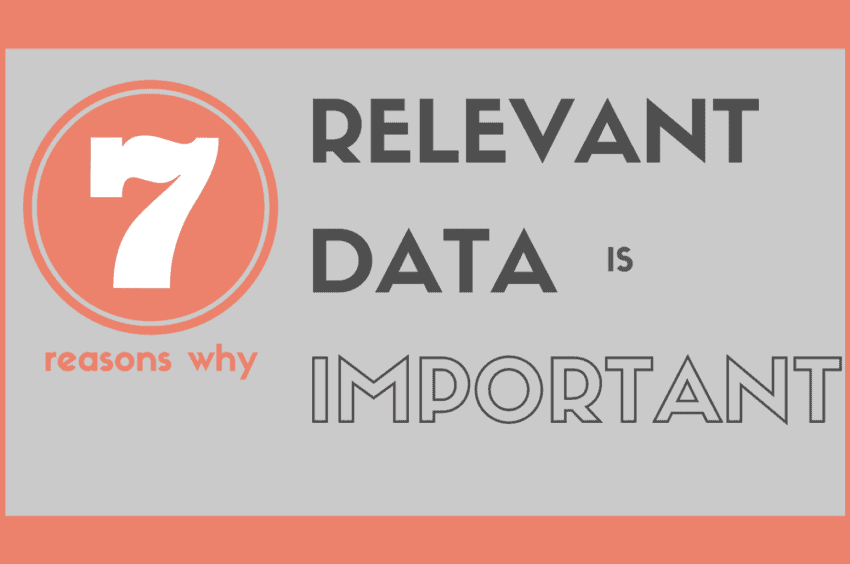7 Reasons Why Relevant Data is Important to Your Organization

Recently, I talked about how Google Data Studio helps marketing solve its biggest challenges — all centered around analytics. But, the importance of relevant data spans all departments. Basing business decisions on data can be the difference between success or failure — for your entire organization.
Just having the metrics isn’t enough. First, the data you’re collecting needs to be relevant to your organization’s goals. It should indisputably report all pertinent information – positive or negative. Then, the metrics collected need to actionable. When reporting insights, your team should be prepared to answer the questions, “Why does that matter?” and “What are we going to do with that information?”.
When you can collect the information then answer those questions, your organization is on its way to reporting relevant data. Here are 7 reasons why that is important:
 1. Relevant data is indisputable
1. Relevant data is indisputable
Relevant, actionable data is your “ace of spades”. But to play that card, you need to first have it in your deck. If your organization wants to make decisions based on facts, having actionable data on-hand empowers you to answer any “why?” questions.
To be crystal clear: relevant data reported correctly is indisputable. Actionable analytics and insights remove the subjectiveness in business. Without the correct reporting in place, all your team has are instincts and opinions being thrown around, taking you in a million different directions. Take the time to set up reporting and present the relevant data. When the numbers are available and understood by everyone in the organization and the data supports your strategy, it becomes difficult (or impossible) for anyone to argue with your approach.
For guidance on how to set up your reports correctly, check out the Google Data Studio blog. To get the know-how on something more specific, you can read how to report social media ROI as well.
 2. Relevant data creates strong strategies
2. Relevant data creates strong strategies
Opinions can turn into great hypotheses, but only with the right reporting in place. And those hypotheses are just the first step in creating a strong strategy. It can look something like this:
“Based on X, I believe Y, which will result in Z.”
Once you have a hypothesis, you can create a strong, measurable strategy and put it to work! The structured criteria of a hypothesis, including data, is your lighthouse while executing the strategy. Compare results to the hypothesis regularly to ensure the campaign is going to plan. If it’s not, make adjustments to reach your numbers. Having the hypothesis, based on relevant data, allows your team to be proactive and achieve more goals. The alternative is being reactive, finding problems that you wish you caught sooner.
 3. Relevant data is necessary for optimization
3. Relevant data is necessary for optimization
How can your team optimize anything if you don’t have meaningful data to support making changes? You can’t. A lot of times, people confuse testing with optimizing. Testing is a part of optimizing, but they aren’t synonyms. Testing is measuring to check the quality, performance, or reliability of something. Optimizing takes those measurements a step further. It means to make the best of or most effective use of something. In order to optimize, you first need to test whatever it is you want to optimize (based on a measurable hypothesis, of course). Then, once you get significant results, your team can start optimizing. Consider starting with one of these aspects:
- Email subject lines
- Website pages
- Ad images
- Form fields
- Pieces of content
 4. Relevant data builds better relationships with customers
4. Relevant data builds better relationships with customers
Data can build better relationships with customers in a number of ways, but let’s focus on a few major ones for now.
Website personalizations
All customers are unique, so the more personalized the experience, the better. But we know that’s not always feasible. So, start with general personalization. Segment your audiences by location, job title, or referral source. Then, deliver relevant information to that audience segment.
Easy website navigation
Take a peek at your website data. What are visitors searching for most? What are the most common conversions? Where is the information your audience is looking for? You can answer all of these questions using Google Analytics. If there are significant results, it might be time to make some changes on your website so visitors can quickly and easily get what they need.
Email Preferences
How frequently do your customers like being contacted? Then, what day of the week and time of day do they prefer? Recognizing and implementing this is a win-win strategy. Your email metrics improve, and customers see you as a resource of information instead of a bother.
 Knowing Customers’ Interests
Knowing Customers’ Interests
If a customer has shown you (through data) that they are NOT interested in something, stop [virtually] shoving it in their faces. Even if you worked really hard on that whitepaper, the customer has closed your 3 popups advertising it multiple times. So, stop showing them the darn pop-up!
(Sorry. Kind of.)
The bottom line? It’s the little things that count. Using data you already have to make that extra effort to improve your customers’ experiences with your company can go a long way. It makes their lives a bit easier, validates their opinions, and makes them feel important.
 5. Relevant data strengthens internal teams
5. Relevant data strengthens internal teams
“All marketing does is post on Facebook.”
“All sales does is go on fun trips.”
“Seriously – how long has product development been working on that update!?”
Surely, we’ve all heard (or maybe said) variations of those comments before. We get it — tensions are high while everyone strives for their goals and works to meet deadlines. But relevant data can help, especially when that data can impact the results of multiple internal teams. Use collected data to prove that the projects teams are focusing on really do matter to the entire organization.
 6. Relevant data quantifies the purpose of your work
6. Relevant data quantifies the purpose of your work
The numbers don’t lie. Data can prove that the projects you’re working on are where your limited time is best spent. It can also support what not to work on. Say you spend 20 hours on each webinar your organization hosts, and you put on 2-4 per month thinking they’re driving leads. But once you look at the report, you realize webinars account for 25-50% of your time on the clock and only bring in 2-5% of leads. Turns out, your time might be best spent on a totally different lead generation campaign.
7. Relevant data helps CYA (cover your…)
Our last reason why data is important to your organization is comical, but oh so true! Protect yourself and your work by collecting AND distributing relevant data. It’s important to make the collected information, good and bad, readily available to key stakeholders. Even if they don’t look at it, you did your part to present the analytics. Not only will you cover your, um…backside, but making the analytics easily accessible communicates transparency and can result in more trust or autonomy for future projects.
Remember: your data always needs to be actionable. Look at the data, crunch the numbers, then make sure you do something with it. That last step is often skipped, and in that case, your analytics are nearly useless.
If you’re interested in making sense of your organization’s relevant data, or even need to start collecting data at all, drop us a line. We’d be happy to help you CYA.
You Might Also Enjoy These Posts
Demand Generation vs Lead Generation
B2B Appointment Setting Tips and Tricks that Always Work
Welcome To DemandZEN
DemandZEN specializes in Account-Based Demand Generation and solving the challenges around finding, engaging and converting target accounts into real opportunities for B2B Technology and Services companies.



